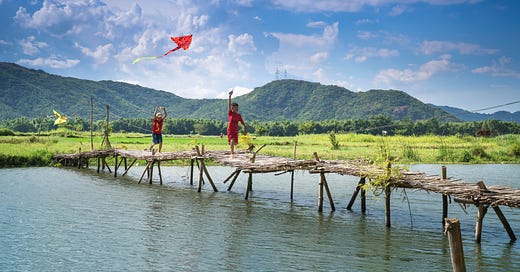Introducing Just Rural Futures: A collective thought project
Aída Guhlincozzi & Grete Gansauer
To mirror the famous opening line of Jane Jacobs’ The Death and Life of Great American Cities: this blog is an attack. It critiques conventional discourses of rurality, rural life, and rural subjects, which are imbued with exclusionary undertones and stereotypes, and it is an attempt from the Rural Geographies Specialty Group of the American Association of Geographers to intervene and build anew. It is our pleasure to introduce the Just Rural Futures Blog:
A collective thought project with feminist and anti-racist orientations to re-narrate what it means to be rural in a way more fit to the material realities of this century.
In popular, political, and, at times, academic discourses, rural communities are too often portrayed reductively as homogeneous places inhabited by people who are poorer, older, ‘dirtier,’ and simpler than their urban counterparts. In the Global North, such stereotypes seem to be associated with whiteness, while in the Global South, rurality is associated with brownness. Across race and class dimensions, rural hinterlands inspire an anachronistic sensibility: places where slow and passé ways of life play out. Stereotypically, traditional politics and earth-bound livelihoods bind the rural to a past-oriented temporality; with one foot rooted in rural space-time, urban space-time pulls national culture and society into the future through dynamism and enterprise.
We—the Rural Geography Specialty Group’s Justice, Equity, Diversity, Inclusion project—call nonsense.
Just Rural Futures intends to challenge this discourse by deliberately widening it. Here, we are collecting reflections, musings, research summaries, critiques, and other writings from a wide range of authors with rural expertise and interests. With this effort, we aim to throw light on the rich complexity and diversity of rural place, people, and space to improve critical understanding of and approaches the flows of value, power, people, and ideas in and through the rural. To us, “just” rural futures center social justice, and exist in vast diversity and richness “just” as they are. Through sharing stories, research, insight, and personal reflection from a breadth of authors and on a range of topics, we hope to remove the spectacle of different-ness in rural spaces.
The Rural Geography Specialty Group is an organization of geographers, both academic, professional, and practitioners who are members of the American Association of Geographers and have an interest in rural geography as a subfield and place of praxis. The Rural Geography Specialty Group board began a committee focusing on issues of justice, equity, diversity, and inclusion in 2022, in an effort to help diversify and support more geographers with rural geography foci. This blog is an extension of sessions organized by the RGSG justice, equity, diversity, and inclusion committee at the 2023 AAG Annual Meeting on the theme of “Towards More Just Rural Futures.” This fall, Just Rural Futures launches by featuring commentary from RGSG leaders, and posts from participants in these sessions.
Just Rural Futures is a collective thought project, aimed in part at challenging conventional narratives about rurality in the 21st century through a social justice lens.
We hope this diverse collection of rural thought, experience, and research might be an open forum for debate, and, thus, a foundation for theorizing the rural geographic condition as it exists and as it is experienced today.
You are invited. To ruminate, to conjecture, to challenge, and perhaps, to share your writing or other creations with us. We will be seeking interdisciplinary reflections and contributions from writers and artists interested in applying a social justice lens to understanding of rural spaces and rural life across all continents. This blog aims to be a collaborative thought space, so we welcome perspectives from those who ‘know’ the rural—through personal experience, research, ancestral history, the arts, or otherwise. Together we can paint a fuller, fairer portrait of rural life: past, present, and future.
- Aída & Grete, co-editors
Aída Guhlincozzi is an Assistant Professor of Geography and Women’s and Gender Studies at the University of Missouri. Her research interests include health geography, health GIS, and race, ethnicity, language, and gender and health care. Aída is on the RGSG board.
Grete Gansauer is a PhD Candidate at Montana State University, where she researches rural development policy and basic infrastructure and service provision in remote regions. Grete is the student representative for RGSG.






As a grad (Mizzou, Geog '80) who lives rural as an angora goat farmer in eastern Kansas, I am interested to see how this progresses.